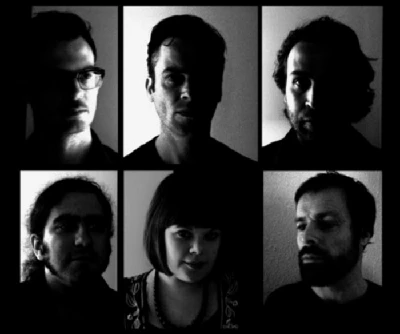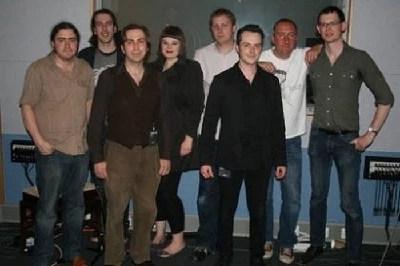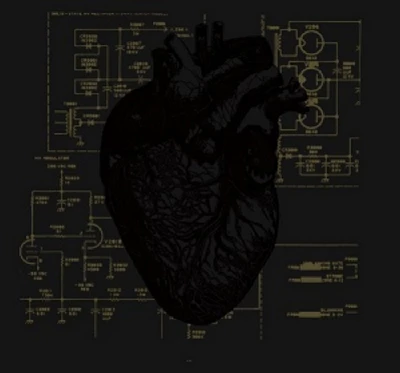published: 15 /
1 /
2012

In our fourth interview with them, John Clarkson talks to Kev Craig, the front man with Manchester alternative rock collective Last Harbour, who will be playing our next Pennyblackmusic Bands' Night', about their new album, 'Your Heart, It Carries the Sound', which was recorded in a church
Article
Last Harbour has always been a group that has avoided repeating itself.
Their last album, ‘Volo’(2010), was recorded over the space of eighteen months in several locations across Britain, It was then handed over by the band, which had always mixed its own records for duties there to producer, Richard Formby, who had recorded and produced their previous record, ‘Dead Fires and the Lonely Spark’(2008), in his Leeds-based studio in ten days.
‘Your Heart, It Carries the Sound’, their latest album, is another departure for the brooding, cinematic collective. It was recorded in St Margaret’s, a church in the group’s native Manchester, with producer Sam Lench, the front man and guitarist with Samson & Delilah, another of the acts on the roster of Last Harbour’s own label, Little Red Rabbit Records.
Both ‘Dead Fires and the Lonely Spark’ were records of sweeping, enormous contrasts, at some moments hushed and elegiacally beautiful, and then at others surging up into stormy discordance. The obsessive characters in front man Kev Craig’s Gothic-tinged lyrics meanwhile lived on the cusp of reason and sanity.
There are still moments of both of these on ‘Your Heart, It Carries the Sound’. ‘The Heath’ erupts up into a sudden surge of thunderous noise in its last minute, and ‘Annabel’ hints lyrically of forthcoming great violence. ‘Your Heart, It Carries the Sound’ is overall, however, both a much more stripped down and sparse record, and its characters, while often occupying their own space in it, are much more at harmony with the rest of the world. ‘Never’, which has been released as a download single, is a pop song, and tracks such as ‘Narrow Hearts’ and the closing trilogy of ‘The Stars Look Down’, ‘If You Mean to Be Lost’ and ‘This is How We Disappeared’ all have a dreaminess.
‘Your Heart, It Carries the Sound’ is the fifth album for Last Harbour since it was formed by Kev Craig and David Armes (guitar, loops) in 1999. Its other albums are ‘The Host of Wild Creatures’ (2002) and ‘Hold Fast, Pioneer (2005). The band has always maintained the same personnel since ‘Hold Fast, Pioneer’, and which has also included James Youngjohns (viola, guitar, pedal steel, mandolin), Mike Doward (bass), Gina Murphy (piano, vocals), Sarah Kemp (viola) and Huw McPherson (drums, percussion). The line-up has also changed with ‘Your Heart, It Carries the Sound’
The band will be playing a week long tour in late March/early April in Britain to promote the new album, and will be playing the London date of it at the Pennyblackmusic Bands’ Night on March 24th at the Half Moon, Herne Hill, South London.
In what is our fourth interview with Last Harbour, Pennyblackmusic spoke to Kev Craig about ‘Your Heart, It Carries the Sound’.
PB: You worked with the Leeds-based producer Richard Formby on your last two albums, ‘Dead Fires and the Lonely Spark’ and ‘Volo’. On this album you, however, decided to stick close to home in Manchester and to record it, rather than in a studio, in a local church. You also employed Sam Lench from as your producer. Why did you choose him to be your producer?
KC: We all really, really liked their last album, ‘And Straight On Till Morning’, which Sam had co-produced. They are also on Little Red Rabbit as well. We thought that it would be nice to keep it amongst friends as much as possible for this one, and it seemed right to get someone who was local and known to us and to make it more of a kind of a family affair.
PB: This album was recorded at St Margaret’s Church in Manchester. Did you decide from the beginning that you didn’t want to record it in a studio?
KC: Yes, we did. We have this bloody-mindedness where we always want to try something different or not repeat ourselves too much when we record. We wanted to try to get a sense of place on this record.
We were not certain that it was definitely going to be a church when we started. The possibility of St Margaret’s came up. A friend of ours, David Burchell, puts on music nights there, and we had been there and seen bands play. It is a big church and central to most of us as it is in South Manchester. Most of us are dotted around the South Manchester area.
PB: How long did it take you to record the album?
KC: We were in there for ten days. It was mainly recorded live. That was something else which we wanted to do as well – to have it in a period of time. It was locked in a place and a time in contrast to ‘Volo’, which was recorded piecemeal and in various places. Although we enjoyed that, we thought that we would do something different for this one.
PB: In the press statement for ‘Your Heart, it Carries the Sound’, it says that you used “the architecture of the building to sculpt and shape the music.” There is almost as much instrumentation and certainly as many players as before on other albums, yet in some ways it seems more stripped down than previous records. There is a thunderous element still on a few songs, but it seems in some ways a quieter album. Was that one of the ways in which you used the architecture of the building?
KC: Yeah, Sam was very deliberate in where he placed us to record in the church. Part of that was that he wanted to use its architecture to get the sound that he wanted and part of that was down to the limitations which the building put on us.
We couldn’t go really loud in St Margaret’s because it is a big church, and when you do that there is natural reverb that can be very difficult to control. Using the building itself as a part of that, to be a character in the record, was kind of at the forefront of our minds really.
PB: Six months before you recorded the album you went and took yourself into isolation in a small Northumbrian cottage to write the songs for it. Where exactly was that?
KC: It was about ten miles south of the Scottish and English border and just below Jedburgh. It really is in the middle of nowhere. There was the house next door, and then there were some lights off in the distance, and that was just about it really.
PB: To pick up again on that point of doing something different, all the other past Last Harbour albums have been largely written in rehearsal and by members bringing something into the practice room. Was this one started completely from scratch in the cottage?
KC: We made a pact in which we would all try and bring something to the cottage, and that none of us would have heard anything that the other people had done. That is largely what happened. A few of the songs were written entirely at the cottage itself and while we were there. All the songs that people brought into the cottage, however, ended up being used on the album. The cottage again influenced the album because none of the rest of us had heard anything from it before we get there.
PB: Were all the songs finished by the time that you left Northumbria?
KC: Some of them were entirely finished. There were one or two other pieces that were more sketches than anything else that I went away and wrote the lyrics for, and others with parts that the band added and subtracted from, but most of it was pretty much done at that point. The only thing that we needed to do with all of them was incorporate the drums into them.
PB: You have members in London and in Newcastle. Did you all turn up to the writing sessions in Northumbria or were some of you unable to attend?
KC: It was all of us except that we had no drummer. The cottage wasn’t probably big enough for a drummer (Laughs). It was David, myself, James, Mike, Gina and Sarah. Sarah does not play on the record, but she was part of the writing process.
PB: Both Huw McPherson and Sarah Kemp have been your regular drummer and violinist for years, pretty much since Last Harbour began really, and on this album they are both absent. Sarah is now playing violin with Lanterns on the Lake who are doing quite well. Are their departures temporary or permanent?
KC: It is difficult to say. It is not permanent from our perspective. Certainly we would definitely work with them again. There has been no kind of animosity. Huw had just had another child, his third, and so he couldn’t do anything with us. Lanterns on the Lake have been doing wonderfully and really, really well. We were fine about Sarah deciding to go with them. We understood that she wouldn’t have the time to do both. She did, however, take part in the writing process. She is there in spirit.
PB: Who replaced them on this album?
KC: The violinist was Elaine Reynolds. She plays violin with the Leeds band Fieldhead. Sarah and her both have a very similar sound. There were just a few songs on ‘Your Heart, It Carries the Sound’ that had violin on, so she came in and very graciously played for us. She listened to Sarah’s parts and
then she duplicated them.
PB: Who is the drummer on ‘Your Heart, It Carries the Sound?
KC: That was Tom Rydeard from Samson and Delilah. He came in and did some drumming for us and on the record.
PB: Who is in the band now?
KC: Tom is not going to be playing live with us. We have a new drummer, Howard Jones, who is not the 80’s singer (Laughs). He has just started and is in practice with us for the live dates. We don’t have a violinist for the live dates, so we are using synths to fulfil that kind of part. There is going to be some doubling up of instruments between the rest of the band as well.
PB: You have told us in previous Pennyblackmusic interviews that the characters on ‘Dead Fires and the Lonely Spark’ were dealing with forces beyond their control and which they didn’t entirely understand, while those on ‘Volo’ were in contrast dealing with inner conflicts and doubts. How do you see the characters in ‘Your Heart, It Carries the Sound’ reacting with the rest of the world?
KC: I consider the lyrics to the songs on ‘Your Heart, It Carries the Sound’ to be a little dreamier, and it to be a softer, a more insular world. I see them as having drifted away from those pressures and outside forces, and to have basically built up an interior world. I see it in that respect to be a much cheerier album (Laughs).
PB: ‘Never’ seems to be to be the closest thing that Last Harbour has ever written to a power ballad..
KC: We call it the pop song. I absolutely agree with that. We didn’t decide beforehand that we were going to write a pop song because we hadn’t done one before, but at the same time we feel that it is very much one of our songs. It is definitely more pop though I don’t feel that that is a dirty word at all.
We did discuss it when we were putting together the album, and about it would sit with the other songs and if it would integrate. At one point we considered not having it on the album, because we we weren’t sure if it would stylistically fit. It is a song that we all like, and in the end we decided that we best stop worrying.
I am not going to say that we are going to increasingly go pop or to have lots of drum machines (Laughs) because I don’t think that is going to happen. A lot us have quite poppy influences and it came out of that. Some of us are fans of ‘Low’ era Bowie and Roxy Music and things like that which have quite a pop sensibility, but are not necessarily writing full-on pop songs.
PB: The title track is the first song on the album. Why did you choose that first song as a name for your album?
KC: Because I think that it extends on that idea of a personal interior world and mirrors the slightly lighter mood of this album. It reflects this idea really of you walking around with your own sound. One of the things about us doing and writing this album – and I know that it is a strange thing to say about an album with a pop song – is we didn’t want to pander to anything really. That is why went away into isolation and why we kept a small circle of people involved with it. We wanted to construct our sound and our own personal world.
PB: You have said in the past that your lyrics are predominantly narrative, but if you look at ‘If You Mean to Be Lost’ that seems to break new ground as well because you have got this repeated lyric that seems to be more of a thought. Would you agree?
KC: The whole sound of that song came out of a guitar loop that David had left on in one of the rooms in the cottage. We had just been out in these beautiful pine woods that were really disorientating and left us all with this wonderful feeling of being kind of lost. I just wanted to convey that feeling through on that song, and although it is still narrative I think it is paring down that narrative to its barest essentials. It is just the bare bones of the story, and again it has like this dreamy feel to it. It is one of my favourite songs on the album.
PB: What can we expect from Little Red Rabbit this year? You are going to be doing the Last Harbour album and single. What else is coming out?
KC: We are going to be doing a series of monthly nights in Manchester. They are starting in April. We are just finalising who is on going to be on particular show. These monthly nights will probably run for about six months. We have also got various album and single projects in the pipeline that we will be announcing as the year progresses.
PB: You are going to be going out on tour in March. You are playing your London date at the Pennyblackmusic Bands’ Night on the 24th March. Where else are you going to be playing?
KC: We are going to be playing Band On the Wall in Manchester, and we are playing a few dates in the North West. We are playing shows in Hebden Bridge, Wigan and Preston. We are also playing shows in the south in Ipswich and Cambridge. We have got seven dates this time.
PB: Thank you.
Picture Gallery:-

